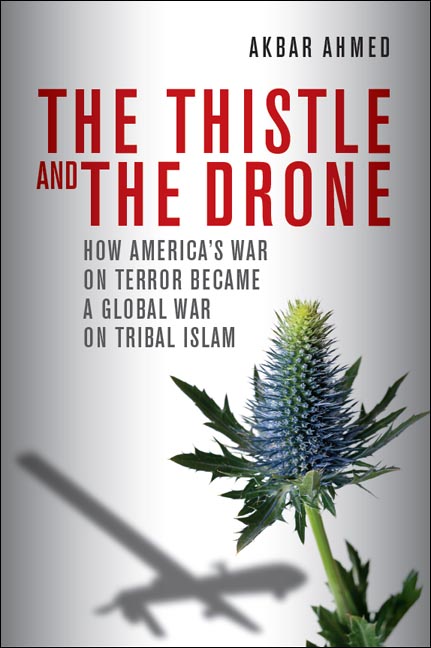 At the Karachi Literature Festival, Akbar Ahmed’s book The Thistle and the Drone (Brookings, 2013) has won the German Peace Prize. The fifth-annual festival, held this past weekend in Pakistan, was co-sponsored by, among others, the Consulate General of the Federal Republic of Germany in Karachi as well as the U.S. Consulate General there.
At the Karachi Literature Festival, Akbar Ahmed’s book The Thistle and the Drone (Brookings, 2013) has won the German Peace Prize. The fifth-annual festival, held this past weekend in Pakistan, was co-sponsored by, among others, the Consulate General of the Federal Republic of Germany in Karachi as well as the U.S. Consulate General there.
Ahmed’s acceptance speech for his book, subtitled “How America’s War on Terror Became a Global War on Tribal Islam,” is reprinted below:
I am so grateful to the Karachi Literature Festival and those that deemed The Thistle and the Drone worthy of this esteemed award. I am also thankful for the support of my wife, my family, my research team, and American University without which this book would not be possible.
After 9/11, it became a matter of urgency for me to both explore and explain the relationship as the gap between the West and the world of Islam had opened dangerously wide. I believed it was not possible to understand what was happening in our world without exploring the different societies and points of view that were involved without solid ethnographic field research. To accomplish this, I have worked on a quartet of studies with Brookings Press exploring the relationship between the two after 9/11, of which The Thistle and the Drone is a part—Journey into Islam, Journey into America, The Thistle and the Drone, and the forthcoming Journey into Europe.
Over the past decades, especially after 9/11, I have committed my life to understanding and explaining the complex relationship between the West and the Muslim world, promoting interfaith dialogue, and building bridges between peoples and communities. With so much violence and turmoil running rampant across the world today, I believe that promoting knowledge and understanding is the key to finding peace.
The need for knowledge is especially relevant to Pakistan, the current state of which distresses me. Having just returned from there, I found much to sadden me as well as much to inspire me. I was proud to see that so many of my fellow Pakistanis, despite the turmoil surrounding them, had not lost their characteristic hospitality, humor, and thirst for understanding. Yet much is left to be done. Above all, Pakistan needs to bring back the vision of the Quaid-e-Azam, Mr. Jinnah. He saw the need for human rights, protection of minorities, the rule of law, and, above all, the promotion of knowledge and understanding. Like the Quaid-e-Azam, I too am inspired by the saying of the Prophet of Islam, ‘The ink of the scholar is more sacred than the blood of the martyr.’
The Brookings Institution is committed to quality, independence, and impact.
We are supported by a diverse array of funders. In line with our values and policies, each Brookings publication represents the sole views of its author(s).




Commentary
Thistle and Drone Book Wins Prize at Karachi Literary Festival
February 10, 2014